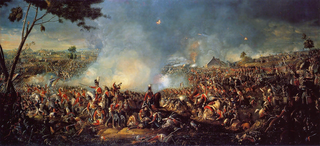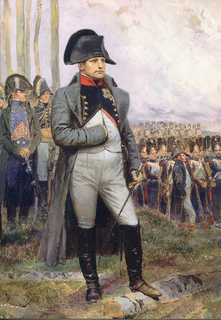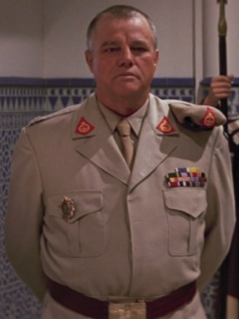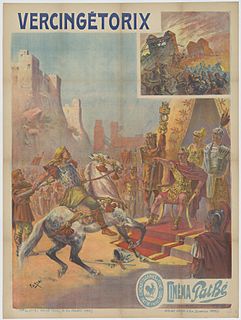
The Battle of Waterloo was fought on Sunday, 18 June 1815, near Waterloo in the United Kingdom of the Netherlands, now in Belgium. A French army under the command of Napoleon was defeated by two of the armies of the Seventh Coalition. One was a British-led coalition consisting of units from the United Kingdom, the Netherlands, Hanover, Brunswick, and Nassau, under the command of the Duke of Wellington. The other was a larger Prussian army under the command of Field Marshal von Blücher. The battle marked the end of the Napoleonic Wars. The battle was contemporaneously known as the Battle of Mont Saint-Jean (France) or La Belle Alliance.
Waterloo most commonly refers to:

Waterloo is a 1970 epic period war film directed by Sergei Bondarchuk and produced by Dino De Laurentiis. It depicts the story of the preliminary events and the Battle of Waterloo and is famous for its lavish battle scenes. It was a co-production between the Soviet Union and Italy, and was filmed in Ukraine.

Bernard Cornwell, is an English author of historical novels and a history of the Waterloo Campaign. He is best known for his novels about Napoleonic Wars rifleman Richard Sharpe. He has also written the Saxon / Last Kingdom stories about King Alfred and the making of England.

Michel Ney, 1st Duke of Elchingen, 1st Prince of the Moskva, popularly known as Marshal Ney, was a French military commander and Marshal of the Empire who fought in the French Revolutionary Wars and the Napoleonic Wars. He was one of the original 18 Marshals of the Empire created by Napoleon I. He was known as Le Rougeaud by his men and Napoleon characterized him as le Brave des Braves, a real paladin in the field, a braggart without judgment and decision in the workroom and after all is said, a Don Quixote.
Sharpe is a series of historical fiction stories by Bernard Cornwell centred on the character of British soldier Richard Sharpe. The stories formed the basis for an ITV television series featuring Sean Bean in the title role.

Napoleon I, Emperor of the French, has become a worldwide cultural icon generally associated with tactical brilliance, ambition and political power. His distinctive features and costume have made him a very recognizable figure in popular culture.
The South Essex Regiment, later the Prince of Wales' Own Volunteers, is a fictional infantry line regiment in the British Army that was created by Bernard Cornwell in the Sharpe novel series.

Brad Whitaker is a fictional character in the James Bond film The Living Daylights. He was portrayed by American actor Joe Don Baker. Baker also appeared as Jack Wade, Bond's CIA contact, in Pierce Brosnan's first two Bond films, GoldenEye and Tomorrow Never Dies. Steven Rubin describes Whitaker as a "smarmy bad-guy arms trader."

World Game is a BBC Books original novel written by Terrance Dicks and based on the long-running British science fiction television series Doctor Who. It features the Second Doctor and the Lady Serena and is set during "Season 6B". It is also a partial sequel to another Dicks' Past Doctor Adventure, Players and documents the return of the Countess.

Sharpe's Waterloo is a historical novel in the Richard Sharpe series by Bernard Cornwell. Originally published in 1990 under the title Waterloo, it is the eleventh and final novel of the "original" Sharpe series, and the twentieth novel in chronological order.

Gaius Julius Caesar, one of the most influential men in world history, has frequently appeared in literary and artistic works since ancient times.
Sharpe's Honour is a 1994 British television drama, the fifth of a series screened on the ITV network that follows the career of Richard Sharpe, a fictional British soldier during the Napoleonic Wars. It is based on the 1985 novel of the same name by Bernard Cornwell.
Sharpe's Waterloo is a British television drama, the 14th part of a series that follows the career of Richard Sharpe, a fictional British soldier during the Napoleonic Wars. The adaptation is based on the 1990 novel of the same name by Bernard Cornwell.
George IV of the United Kingdom has been depicted many times in popular culture.

The ancient Gallic chieftain Vercingetorix has appeared many times in works of popular culture.

The Fields of Death is the fourth and final book in Simon Scarrow's Wellington and Napoleon Quartet, which tells the story of the French Revolution and the Napoleonic Wars from the point of view of Sir Arthur Wellesley and Napoleon Bonaparte.

Waterloo: The History of Four Days, Three Armies and Three Battles is a history book written by Bernard Cornwell, first published in Great Britain by William Collins on 11 September 2014, and by Harper Collins Publishers on 5 May 2015 in the United States. It is Cornwell's first work of nonfiction, after publishing more than forty novels in the historical fiction genre, including the popular Richard Sharpe series taking place during the Napoleonic Wars. The book recounts the Battle of Waterloo on 18 June 1815, including preceding events from the campaign of the same name and The Hundred Days.
The Napoleonic Wars were a defining event of the early 19th century, and inspired many works of fiction, from then until the present day.